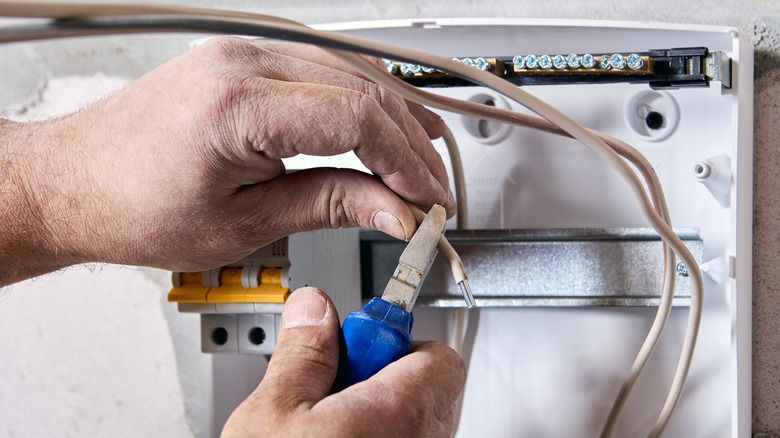The Problematic Type Of Electrical Wiring Mike Holmes Avoids Using (And Why)
You probably don't think so much about the wiring in your home since it's hidden. It's likely you only think about it when you flip a switch, but your light doesn't come on. However, when it comes to electrical work, Mike Holmes doesn't sugarcoat it. He's all about safety, longevity, and doing things the right way. And concerning home wiring, there is one material he's openly warned homeowners about: aluminum. Aluminum wiring was a cheaper alternative to copper, especially during times of metal shortages. However, this kind of wiring can be unsafe, especially if it has been left untouched for decades. Aluminum wiring simply doesn't stand the test of time. It may have been a cost-effective substitute for copper in the 1960s and 70s, but today, it's a leading cause of loose connections, electrical fires, and power failures. On Holmes' YouTube channel and website, he repeatedly urges homeowners to get aluminum wiring inspected and replaced.
Holmes points out that copper is the preferred form of wiring by the Electrical Safety Authority (ESA) and is found in most modern homes. While there are a lot of home upgrades that Mike Holmes considers a waste of money, for homes that already have aluminum wiring, it is recommended to upgrade with two safe solutions. Either a full replacement with copper, which is expensive but ideal, or opting for alumiconn connectors, a solution that uses special connectors to safely link aluminum to copper leads at critical points (outlets, switches, junction boxes). This upgrade is a home DIY project you should avoid completely and should only be done by a licensed electrician.
The issues with aluminum wiring
Aluminum wiring might have saved builders money decades ago, but it's become one of the most notorious safety hazards in older homes today; hence Mike Holmes' disapproval of it. It's important to know the hidden dangers of aluminum wiring. The first reason is that it expands and contracts. Aluminum reacts more to temperature changes than copper. Every time you use an appliance or turn on a light, the current heats up the wire. With aluminum, that heating and cooling causes microscopic movement, which loosens connections over time. Holmes makes it very clear that loose connections equal arcing and, eventually, fire risk. Another problem is oxidation and corrosion. When exposed to air, aluminum quickly forms an oxide layer that is a poor conductor. The more it oxidizes, the worse it performs, increasing resistance and heat buildup at outlets and switches.
Another major issue is that aluminum is more likely to bend or break when being handled. This makes it vulnerable to physical damage. There's also the problem of incompatibility with modern devices, as most switches, outlets, and circuit breakers are designed with copper in mind. Using aluminum wiring with copper terminals can result in an electrochemical reaction that degrades the connection over time. It's also harder to insure or sell homes with aluminum wiring because some home insurance companies refuse coverage or require extensive inspections if this type of wiring is found. If your home has aluminum wiring, don't panic, but don't ignore it either. Get a licensed electrician to evaluate it. Safety is always the priority, and when it comes to electricity, Holmes says it best: "Do it right the first time."

